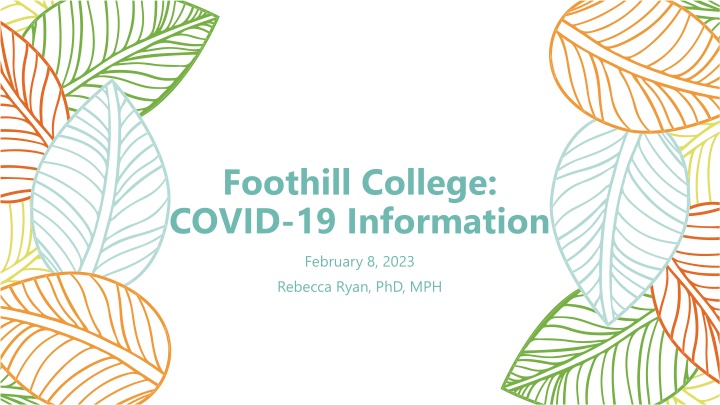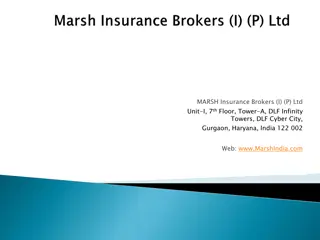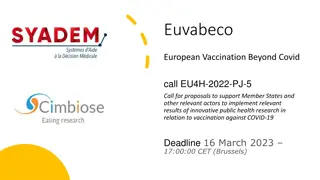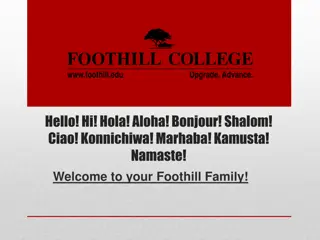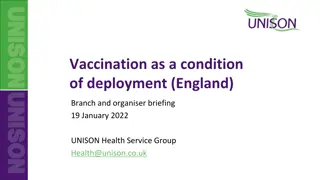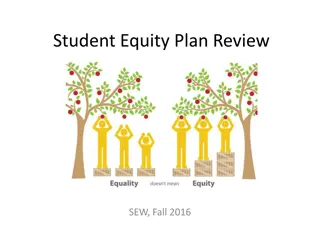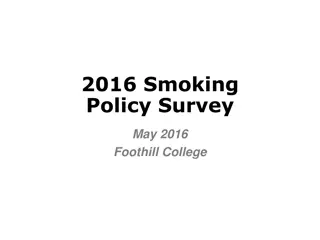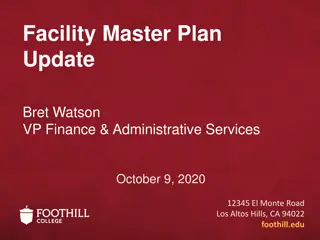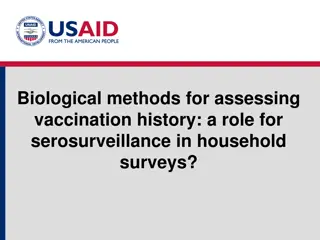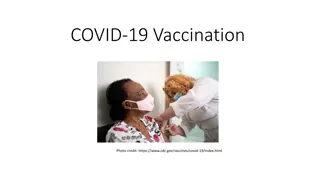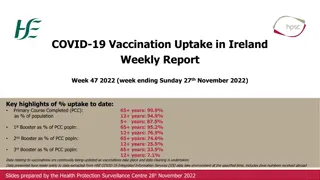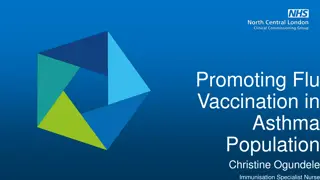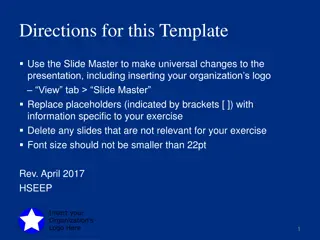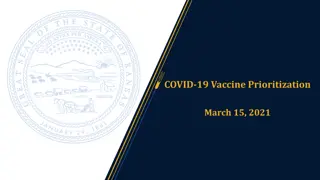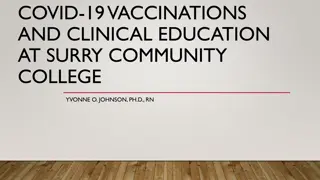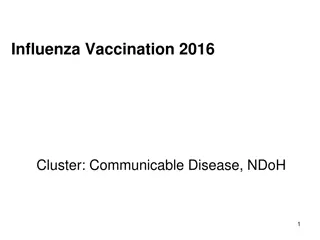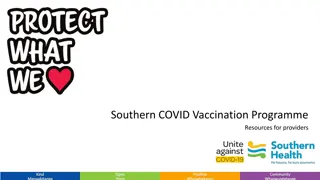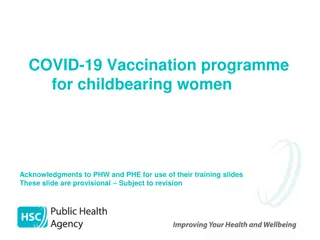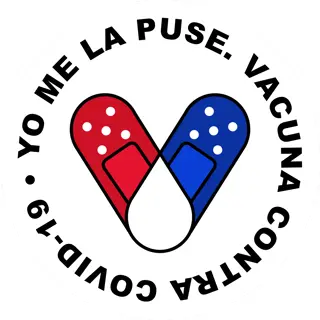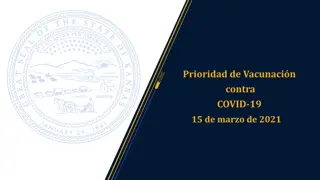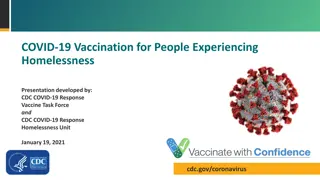COVID-19 Vaccination Efficacy Study at Foothill College
A study conducted at Foothill College analyzed the efficacy of COVID-19 vaccinations among students who reported infections between November 2022 and February 2023. The study compared individuals who received monovalent boosters prior to September 2022 with those who received bivalent boosters from September 2022 onwards. Findings showed that individuals boosted with the bivalent booster had varying levels of protection, with some acquiring COVID-19 within four months of receiving the booster. In contrast, individuals who only received the monovalent booster showed a lower infection rate within the same timeframe.
Download Presentation

Please find below an Image/Link to download the presentation.
The content on the website is provided AS IS for your information and personal use only. It may not be sold, licensed, or shared on other websites without obtaining consent from the author.If you encounter any issues during the download, it is possible that the publisher has removed the file from their server.
You are allowed to download the files provided on this website for personal or commercial use, subject to the condition that they are used lawfully. All files are the property of their respective owners.
The content on the website is provided AS IS for your information and personal use only. It may not be sold, licensed, or shared on other websites without obtaining consent from the author.
E N D
Presentation Transcript
Foothill College: COVID-19 Information February 8, 2023 Rebecca Ryan, PhD, MPH
Foothill College: Vaccine Policy Requirement: Fully vaccinated, though boosters required in policy, not required for registration (just primary series) at Foothill College COVID Landscape: Since Sept 2021, SARS-CoV-2 has evolved from its original (ancestral) strain into variants including Alpha, Delta, and hundreds of Omicron subvariants.
COVID Vaccine Schedule COVID Booster Scheduling/Availability (United States): 1. Monovalent (primary series) vaccination: 2 doses of Pfizer or Moderna OR 1 dose of Johnson & Johnson. 2. Monovalent booster (offered beginning in late 2021): 1 additional dose of original-formula Pfizer at least six months after primary series. 3. Bivalent booster offered beginning September 1, 2022: Updated Pfizer or Moderna bivalent vaccine occurring at least two months after primary series or first booster. Only option for booster now. 4. Additional boosters: No additional boosters are recommended or available for immunocompetent people
Efficacy of Vaccinations with XBB 1.5 Variant XBB 1.5 is current dominant variant. Data below derived from studies evaluating XBB 1.5 and bivalent booster to match current COVID climate. Bivalent Boosters; XBB 1.5: XBB 1.5 substantially escapes neutralizing antibodies but not T-cell responses after bivalent boosting Booster provides decreasing protection against infection due to high transmissibility and immune-evading properties than predecessors. Higher protection against infection in the 2-3 months that follow boosting versus no booster at all Protection declines in the months/weeks that follow; some data shows a return to baseline after three months Still offers protection against serious outcomes related to hospitalizations/death though decline is sharper for older adults.
Efficacy of Vaccinations: Foothill College Population: Student-only population (excluding Allied-health students) who reported COVID+ infections between Nov 2022-Feb 2023 Data Collection: Early March 2023. Sample: 22 COVID+ people had either monovalent booster (prior to Sept 2022) or bivalent booster (Sept 2022 and beyond) Findings: Booster types (n=22): 27% bivalent booster, 73% monovalent booster Of the 6 people who had been boosted with the bivalent booster, 83% (n=5) acquired COVID less than 4 months after receipt of the booster The other person (n=1) tested positive between 4-5 months after getting the bivalent booster. --------------------------------------------------------------------------------------------- Of the 16 people who received the monovalent booster only, 19% (n=3) acquired COVID less than 4 months after receipt of the booster Remaining 81% (n=13) tested more than five months after receipt of the monovalent booster.
Efficacy of Vaccinations: Ohlone College Population: Students, staff, and faculty who reported COVID+ infections between Nov 2022-Feb 2023 Data Collection: Early March 2023. Sample: 34 COVID+ people had either monovalent booster (prior to Sept 2022) or bivalent booster (Sept 2022 and beyond) prior to infection Findings: Booster types (n=34): 44% bivalent booster, 56% monovalent booster Of the 15 people who had been boosted with the bivalent booster, 60% (n=9) acquired COVID less than 4 months after receipt of the booster The remaining 40% (n=6) tested positive between 4-5 months after getting the bivalent booster. --------------------------------------------------------------------------------------------- Of the 19 people who received the monovalent booster only, 11% (n=2) acquired COVID less than 4 months after receipt of the bivalent booster 5% (n=1) acquired COVID between 4-5 months after, and the remaining 84% (n=16) tested more than five months after receipt of the monovalent booster.
Note: Data for informational purposes only This data has many limitations and biases. Thus, this data is for informational purposes only and not generalizable to the entire Foothill population. While informative, conclusions shall not be drawn from this limited sample. Only those who have tested positive for COVID and reported it were included in this data. There may be many people who had the monovalent and/or bivalent vaccinations and never tested positive for COVID.
End of California and Federal State of Emergency: What this means for vaccination opportunities California s State of Emergency declaration ended on February 28, 2023, while the federal state of emergency will end May 11, 2023 There may be a reduction or elimination of free and easy access to vaccines, tests and treatments in a matter of months depending on state and federal supply followed by a reduction of support from the state for mass testing/vaccination sites Foothill does not provide health insurance nor COVID vaccines on campus (not included with student health fee). Some staff/adjuncts not provided health insurance. Thus, the cost of COVID vaccinations will eventually fall to the consumer and/or insurance groups once federal stockpiles are exhausted. The cost for a single-dose COVID vaccination may range from an estimated $96-130 per dose for uninsured consumers. Requiring a vaccine policy to continue without providing free and easy access may place a burden upon vulnerable populations.
Summary Compared with published scientific literature, emerging data from both Foothill College and Ohlone College align with findings showing vaccinations including monovalent and bivalent boosters cannot fully prevent COVID infections. Protection against infection from boosters may only last a few months. Community members will have staggard protection against symptomatic infection for a short period throughout the year which may or may not coincide with their on-campus presence. Requiring vaccination and/or boosters may have short-term protection for individuals but may not provide a significant campus-wise reduction in already low transmission of COVID as vaccinated/boosted community members may still acquire COVID and have the ability to transmit to others on campus. Instead, Foothill College is encouraged to support health promotion programs including health education, linkages to health resources such as COVID treatments, and to opportunities for masking, ventilation, and monitoring of COVID.
